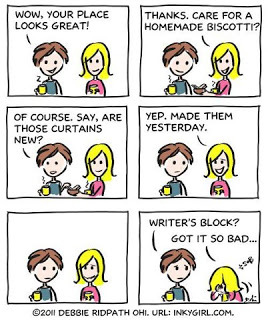It’s All About the Dialog
 A great story with weak characters is a big a fail, but so is wonderfully developed characters who spout weak dialog. Like all writing, good dialog requires both craft and conception. It’s the best way to draw readers into your story and get them involved with the characters. The conversations between your fictional people should reveal character and promote the plot as well. You don’t want to waste dialog on anything the character says that doesn’t promote these two goals.
A great story with weak characters is a big a fail, but so is wonderfully developed characters who spout weak dialog. Like all writing, good dialog requires both craft and conception. It’s the best way to draw readers into your story and get them involved with the characters. The conversations between your fictional people should reveal character and promote the plot as well. You don’t want to waste dialog on anything the character says that doesn’t promote these two goals.One dialog mistake that will scare any publisher’s editors away from your work is using dialog to clumsily fill in your back story. You must not have one of your characters tell another one things that person already knows. You hear it on CSI every week – one expert explaining things that another expert certainly knows. You can get away with this kind of thing on television, but not in your novels or short stories. Readers know how unrealistic this is.
Here’s another scary example of bad dialog that I made up. I’m exemplifying here a writing technique that makes many editors groan. It’s the result of writers trying to make their dialog more colorful:
“I won’t put up with it,” Eve shrieked. “I’ll leave you if it happens again.”“You can’t do that,” Adam moaned. “You’re a part of me.”“Not anymore,” Eve snapped. “But I love you,” Adam whined weakly.“Then your time in paradise is over,” she chortled.
She chortled? Silly, but do you see what’s happened here. In an effort to make the dialog more interesting, you can end up making it laughable. There is nothing wrong with the simple word “said” in your dialog. You might fear that it’s boring, but actually it’s neutral. It’s almost invisible. And because it does not draw attention to itself, it keeps the reader’s focus on your characters’ words.
If you want variety in your dialog, consider varying the format and adding some action or description. Here are the exact same quoted words, with the surrounding words rewritten:
Eve’s words exploded at him. “I won’t put up with it! I’ll leave you if it happens again.”“you can’t do that,” Adam said. Pain showed on his face. “You’re a part of me.”“Not anymore.” “But I love you,” Adam said in a low, childlike voice.“Then your time in paradise is over.”
There’s the same conversation, with only one “said” and no substitute verbs. Of course those substitute verbs do carry meaning, and maybe it’s important to you that we know that eve was laughing at her man in that last line. If that’s true then it’s okay to just say so.
“But I love you,” Adam said, trying to hold her eyes with his own. He withdrew in horror when Eve laughed right in his face.“Then your time in paradise is over.”
We’ll talk more about our made-up conversation next week, and discuss other dialog tips.
Published on May 30, 2015 15:54
No comments have been added yet.



